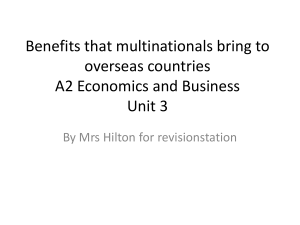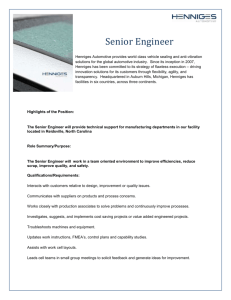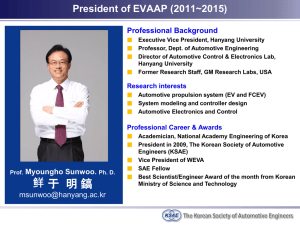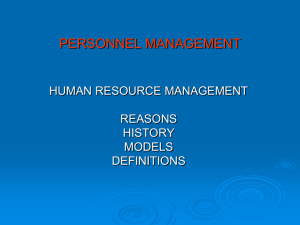Transnational influences on employee participation Guglielmo Meardi Findings from a recent research project led from the University of Vienna with IRRU involvement
advertisement
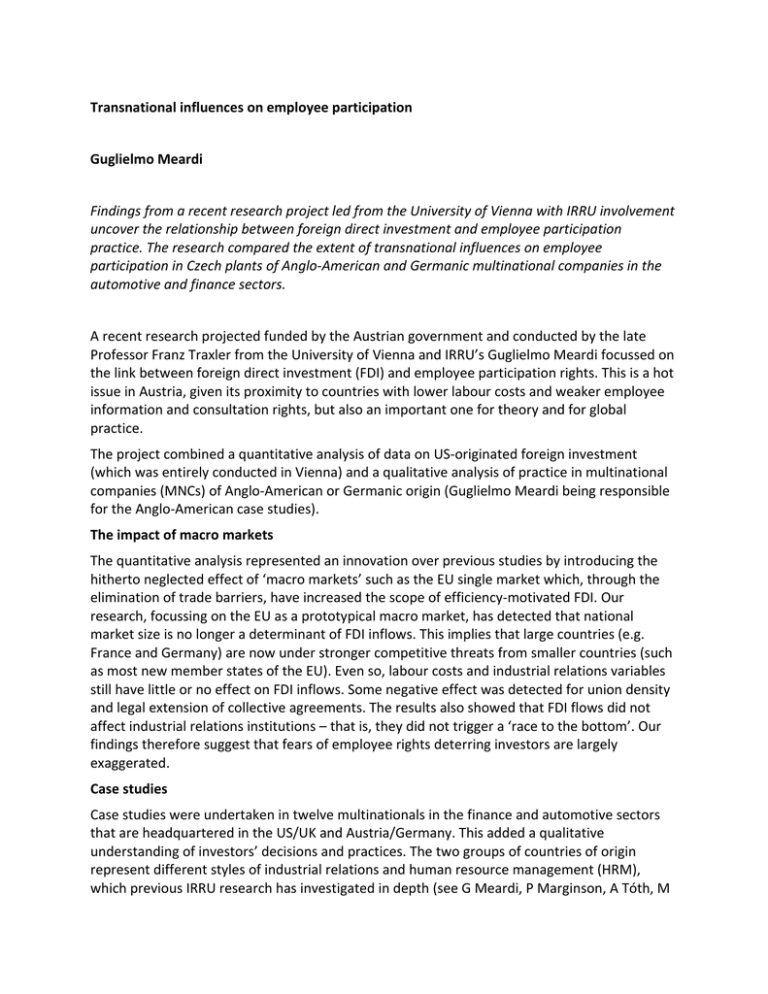
Transnational influences on employee participation Guglielmo Meardi Findings from a recent research project led from the University of Vienna with IRRU involvement uncover the relationship between foreign direct investment and employee participation practice. The research compared the extent of transnational influences on employee participation in Czech plants of Anglo‐American and Germanic multinational companies in the automotive and finance sectors. A recent research projected funded by the Austrian government and conducted by the late Professor Franz Traxler from the University of Vienna and IRRU’s Guglielmo Meardi focussed on the link between foreign direct investment (FDI) and employee participation rights. This is a hot issue in Austria, given its proximity to countries with lower labour costs and weaker employee information and consultation rights, but also an important one for theory and for global practice. The project combined a quantitative analysis of data on US‐originated foreign investment (which was entirely conducted in Vienna) and a qualitative analysis of practice in multinational companies (MNCs) of Anglo‐American or Germanic origin (Guglielmo Meardi being responsible for the Anglo‐American case studies). The impact of macro markets The quantitative analysis represented an innovation over previous studies by introducing the hitherto neglected effect of ‘macro markets’ such as the EU single market which, through the elimination of trade barriers, have increased the scope of efficiency‐motivated FDI. Our research, focussing on the EU as a prototypical macro market, has detected that national market size is no longer a determinant of FDI inflows. This implies that large countries (e.g. France and Germany) are now under stronger competitive threats from smaller countries (such as most new member states of the EU). Even so, labour costs and industrial relations variables still have little or no effect on FDI inflows. Some negative effect was detected for union density and legal extension of collective agreements. The results also showed that FDI flows did not affect industrial relations institutions – that is, they did not trigger a ‘race to the bottom’. Our findings therefore suggest that fears of employee rights deterring investors are largely exaggerated. Case studies Case studies were undertaken in twelve multinationals in the finance and automotive sectors that are headquartered in the US/UK and Austria/Germany. This added a qualitative understanding of investors’ decisions and practices. The two groups of countries of origin represent different styles of industrial relations and human resource management (HRM), which previous IRRU research has investigated in depth (see G Meardi, P Marginson, A Tóth, M Stanojević, M Frybes and M Fichter (2009) ‘Varieties of multinationals’, Industrial Relations, 48 (3), 489‐512). The host‐country focus was on sites in the Czech Republic, as the new member state closest to western markets and the one with the most competitive manufacturing sector in terms of export. The research also included headquarters‐level interviews with both mangers and employee representatives. Key findings None of the companies appeared to have given significant attention to industrial relations factors when choosing the location of their investment, confirming the interpretation of the quantitative data. The heavy emphasis on employment deregulation as a crucial factor enhancing competitiveness among new member states’ governments appears to be exaggerated. Formal, representative‐based arrangements for employee participation (e.g. works council‐type structures) are mainly found on ‘brownfield’ industrial sites, as a legacy of pre‐existing arrangements with trade unions before acquisition. As a corollary, it is hard to detect any effect from home country practice in German‐ or Austrian‐based MNCs, or from implementation of the EU Directives on the information and consultation of employees or on European Works Councils. More generally, companies tend to be very opportunistic in the degree of their practice transfer. Extensive transfers in the area of production are matched by only selected transfers in the industrial relations and HRM spheres (see Table). Anglo‐American companies are distinctive in the extent to which their direct participation practices are elaborated, especially in the finance sector. They emerge as transferring their HRM and industrial relations practices (seen as a competitive advantage) more often than their German or Austrian counterparts, which see them rather as a cost. However, these direct participation practices appear to be insufficient to address high labour turn‐over and employee dissatisfaction with internal communication. There are significant differences between the manufacturing and service sectors. In the finance sector (contrary to the commonly held view that in services MNCs adapt to local traditions), major change in employment relations and participation practice follows from radical innovation in products and modes of service delivery, of which foreign companies are the drivers. Yet there is little transnational communication with home country operations. In the automotive sector, practices are more affected by the strong industrial traditions of the host country, despite the international integration of production. They also depend on the geography of the production networks. This can be of three types: • ‘spatially close’ (the neighbouring Austrian factories managed directly from the headquarters, where a maximum of re‐organization and divergence from home country practice was observed); • ‘mid‐range’ (the German companies, sufficiently close to relocate, but not enough to integrate Czech and German factories, resulting in strong competitive pressure); or • ‘loose’ (the US and often UK factories, servicing separate markets and therefore less affected by competition, and more similar to the service sector companies.) Employee representatives are more concerned with transnational co‐operation and the comparison of employment conditions in the automotive sector – characterised by very strong international competition – than in the banking sector. However, the medium size of the manufacturing companies under investigation (representative of the large majority of investors) does not allow the development of strong networks of employee representatives. European Works Councils, where they exist, are rather weak actors. Czech representatives tend to be very interested in comparison with western conditions in order to prepare their local demands, but they are also increasingly concerned with countries further East (e.g. Ukraine, Romania, Turkey), where production may be relocated to. Findings from this research project are presented in more detail in: F Traxler, G Meardi and S Strohmer, ‘Multinationals and social transfers to central eastern Europe: British, US, Austrian and German experiences reviewed’, in S Contrepois, V Delteil, P Dieuaid and S Jefferys (eds), Globalising employment relations, Palgrave (forthcoming, 2010). Multinationals’ practices in the Czech Republic Sector and country of origin Production HRM transfers transfer IR transfer IR style in subsidiary Transnation‐ al union contacts Medium Low Paternalistic /unilateral Contingent on company size and location Medium/ high Very low Pluralist Medium Medium/ high Medium/ high Low Paternalistic Medium High Medium High Individual‐ ised Automotive High Germany/ Austria Automotive High UK/US Finance Germany/ Austria Finance UK/US Low
